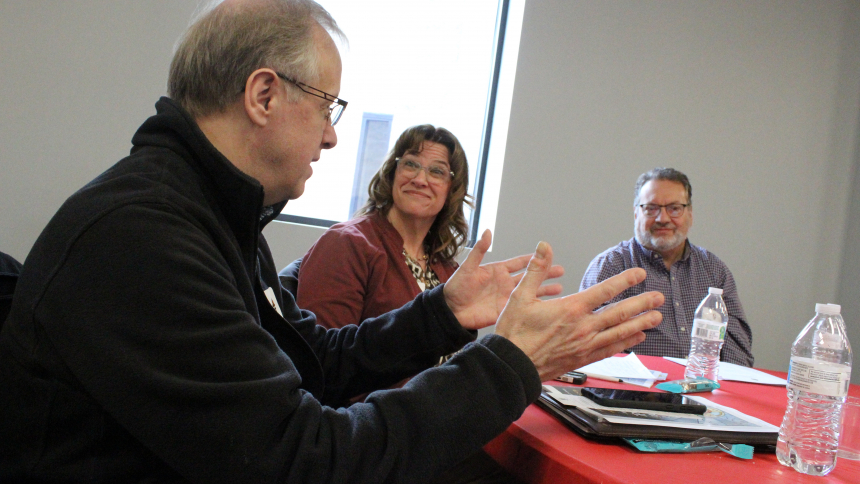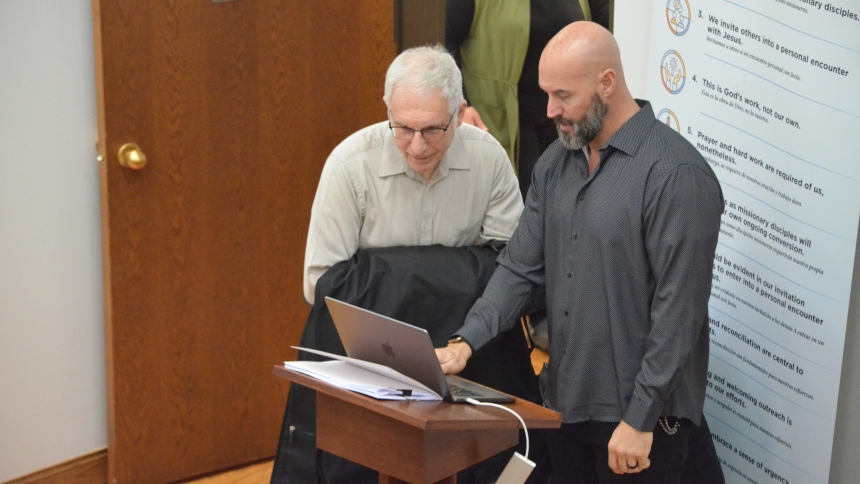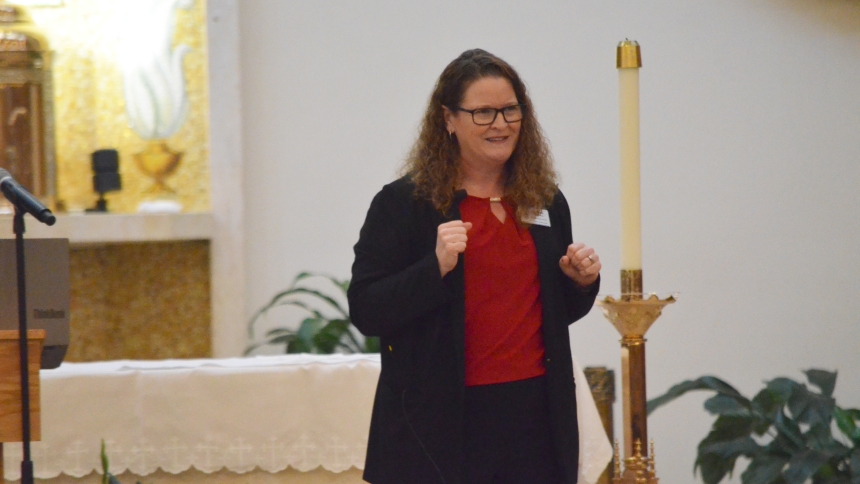
EAST CHICAGO – The topic for the Diocesan Pastoral Council at its March 26 meeting hit close to home – delegates were asked to discuss their consultative role, makeup and agendas and how each facet “meets the needs of this moment in the life of our local Church.”
Following Mass celebrated by Bishop Robert J. McClory and the formal blessing of the new parish hall at St. Mary, where the session was hosted, more than 60 parish delegates and diocesan representatives got down to business in a series of small group discussions.
“Our focus today is the work of this body, the work of the pastoral council,” said moderator Deacon Dan Lowery.
Bishop McClory explained that with diocesan listening sessions and priest’s meetings concluded, the Diocese of Gary’s work for the 2022 Synod on Synodality called by Pope Francis to engage the worldwide Catholic Church has moved to the parish and institutional portion of the process. “Now the parishes and every (diocesan) institution has a page of questions – that you formulated – to reflect on their own success,” he explained. The result is a Parish (or Institutional) Action Plan that is due to the bishop by June 1.
“They should all develop a select set of action steps that hold promise with respect to the two priorities that emerged out of our synod process,” Bishop McClory added.
With respect to the Diocesan Pastoral Council, group discussions centered around three “spiritual conversations”:
1. Does our understanding of the (consultative) role played by our DPC meet the needs of this moment in the life of our local Church?
2. Does the makeup of our DPC meet the needs of this moment in the life of our local Church?
3. Do our agendas meet the needs of this “synodal moment” in the life of our local Church?
At the end of the morning, each of the 11 small groups was represented by a delegate who summarized “nuggets” gleaned from each of the discussion topics for the bishop and each other to hear.
In general, the groups agreed their role as a “consultative body” advising the bishop is appropriate, although some suggested more collaboration. “A lot of us are made up for implementation (roles),” said Vicky Hathaway, diocesan consultant for the Office of Youth and Young Adults, while Michael Catania of Nativity of Our Savior in Portage pointed out that consultation only works “as long as the bishop hears what he needs to hear.”
Judy Bird, representing St. Martin of Tours in LaCrosse, noted, “I am required by our parish administrator to give a report (from every diocesan pastoral council meeting) to our parish council.”
“We should be reporting back to our parish councils on our discussions; it may give them a spark (to take some action),” Deacon Paul Progar of Sacred Heart in Whiting said in his group’s discussion session.
The makeup of the council was less satisfactory to the small groups, virtually all of which encouraged more diversity in terms of age, ethnicity and race. Noting that each parish is allowed one delegate, Hathaway’s group suggested broadening the membership to include a delegate named by diocesan departments such as the office of youth and young adults and the intercultural ministries, as was done for the diocese’s 2017 synod.
“The delegates probably reflect the makeup of our parishes,” noted Marie Campbell of Notre Dame in Michigan City. Maybe we could have deanery pastoral councils that send reps to the DPC, or we could rotate reps at each meeting to get more diversity.”
As for agenda topics, which have included discipleship/formation, stewardship, young Catholics (twice), a time of transition (reflecting Bishop McClory’s arrival), a post-COVID-19 return to the Church and the 2022 Synod, Bird suggested revisiting same topics, Angie Karagiannakis of Our Lady of Sorrows in Valparaiso asked for more emphasis on catechesis, and another table offered the need for more sensitive topics like gender identity and protecting the family.
Bishop McClory thanked the delegates for their input and noted that all consultative groups in the diocese are going through the same process of “reflecting on how they see their mission.”
He reminded the council that his Pastoral Letter on the 2022 Synod, “We Proclaim Jesus as Lord,” listed his five commitments to the process, including support for the parish action plans, a review of Pastoral Center operations, a round of parish visits, a reassessment of the diocese’s consultative groups and a review of financial assistance options to implement parish action steps.


